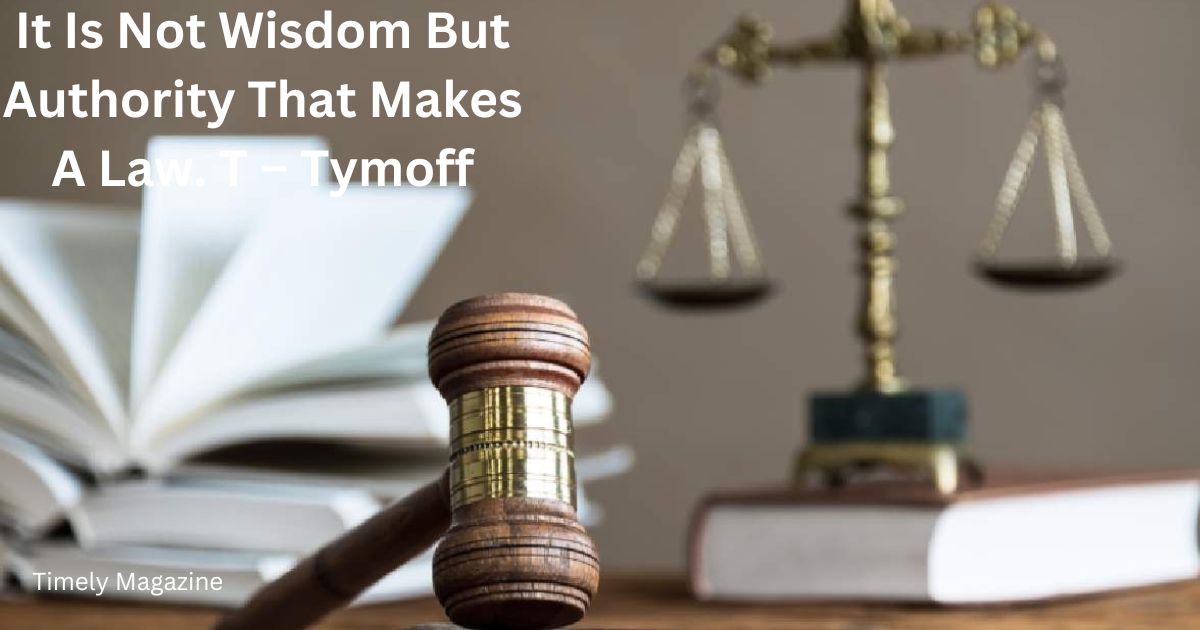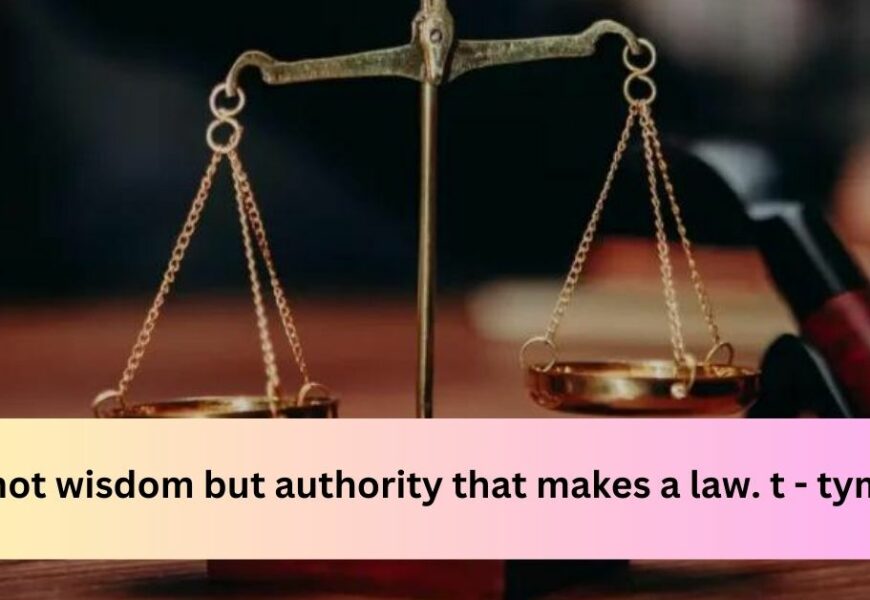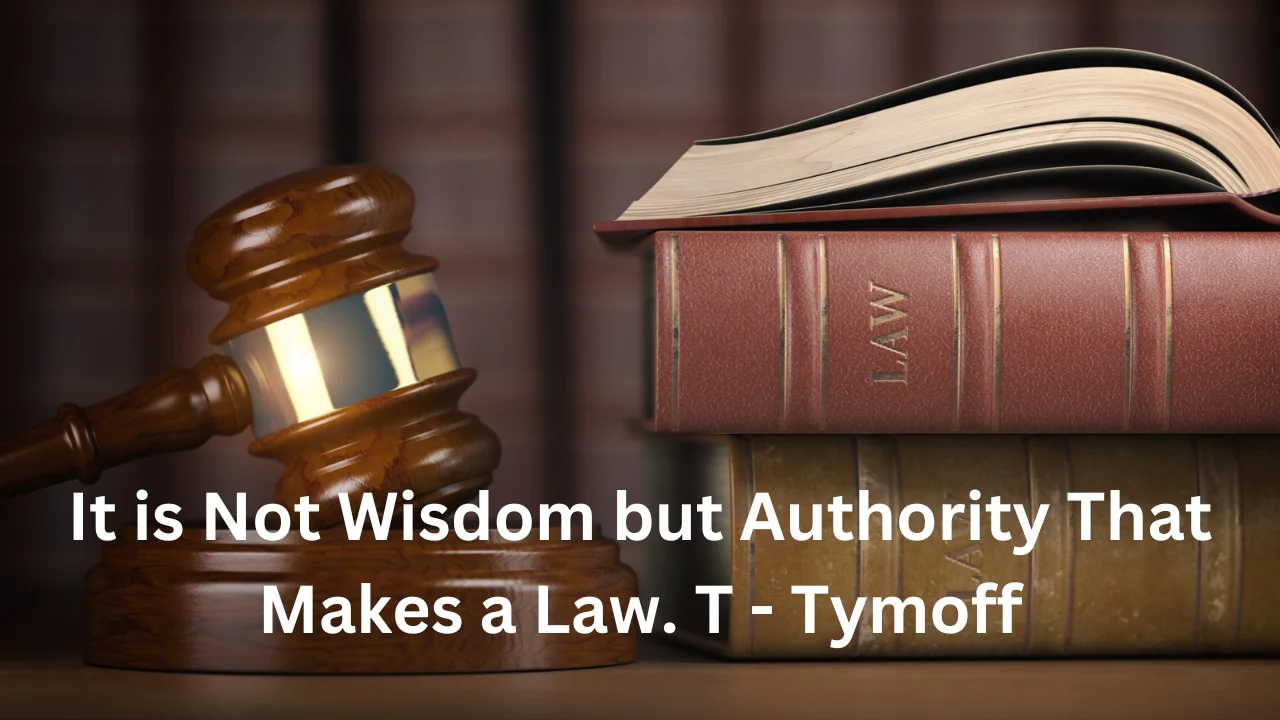Introduction:
it is not wisdom but authority that makes a law. t – tymoff In the intricate tapestry of societal structures, the concept of law serves as the backbone, providing order and stability. However, the relationship between wisdom and authority in the formulation of laws has been a subject of perennial debate. The age-old adage, “It is not wisdom but authority that makes a law,” encapsulates a paradox that challenges the fundamental principles of governance. In this exploration, we delve into the intricacies of this statement, examining its historical context, its implications on modern legal systems, and the enigmatic “Tymoff” factor that has become synonymous with this paradox.

The Historical Nexus:
To comprehend the essence of the statement, it is imperative to trace its roots through the annals of history. From ancient civilizations to contemporary societies, the establishment of laws has often been intertwined with the wielders of authority. The pharaohs of Egypt, the emperors of Rome, and the monarchs of medieval Europe exemplify instances where authority played a pivotal role in legislative processes. The question that arises is whether these laws were a product of sagacity or a mere manifestation of power dynamics.
must read= love what you have, before life teaches
The Wisdom Conundrum:
Wisdom, characterized by profound knowledge, experience, and discernment, seems inherently linked to the formulation of just and equitable laws. The philosophical underpinnings of thinkers like Aristotle and Plato emphasize the importance of wisdom in governance. In a utopian society, laws would be crafted through a collective wisdom that prioritizes the well-being and justice for all. However, reality often deviates from this ideal, as political power and authority assert their dominance over the intricate nuances of wisdom.
Authority as a Catalyst:
Contrary to the idealistic notion of wisdom guiding the creation of laws, history showcases numerous instances where authority usurped this role. The wielders of power, whether kings, emperors, or autocrats, often imposed laws to consolidate their authority and control the masses. The concept of divine right, where rulers claimed their legitimacy from a higher power, further exemplifies the nexus between authority and legislation. In such scenarios, laws became instruments of control rather than embodiments of societal wisdom.

Tymoff: The Enigmatic Element:
The “Tymoff” factor introduces an enigmatic dimension to the paradox, further complicating the relationship between wisdom and authority. The term “Tymoff” is believed to be a reference to a hypothetical entity or force that influences the decision-making process behind laws. Scholars and theorists have grappled with the nature of Tymoff, questioning whether it represents an unseen hand guiding authorities or a symbolic representation of the unpredictable elements that shape legislative outcomes.
Modern Legal Systems:
As societies evolved and embraced democratic principles, the role of wisdom in lawmaking gained prominence. Constitutions, often hailed as embodiments of collective wisdom, became the guiding documents for legal systems. Elected representatives were entrusted with the responsibility of crafting laws that reflected the values and aspirations of the populace. However, even in democracies, the interplay between authority and wisdom remains complex, with lobbying, political maneuvering, and vested interests influencing legislative decisions.
Challenges to the Paradigm:
The contemporary legal landscape poses challenges to the age-old paradigm that authority trumps wisdom in lawmaking. The rise of human rights movements, advocacy for social justice, and the emphasis on inclusivity are reshaping the dynamics of legislative processes. Calls for transparency, accountability, and citizen participation seek to elevate the role of wisdom in shaping laws, reducing the arbitrariness associated with unchecked authority.

Balancing Wisdom and Authority:
As societies grapple with the Tymoff paradox, the quest for a harmonious balance between wisdom and authority becomes imperative. Wisdom, harnessed through informed discourse, ethical considerations, and an understanding of diverse perspectives, should guide the formulation of laws. Simultaneously, authority must be wielded responsibly, with checks and balances in place to prevent the misuse of power for self-serving purposes.
Conclusion:
In the intricate dance between wisdom and authority, the Tymoff paradox remains a philosophical conundrum that resonates through the corridors of governance. As societies navigate the complexities of lawmaking, a nuanced approach that acknowledges the value of wisdom while curbing the excesses of authority is essential. The evolving nature of legal systems, influenced by societal values and global dynamics, underscores the perpetual quest for a delicate equilibrium in the formulation of laws. In the grand tapestry of human civilization, the interplay between wisdom and authority will continue to shape the trajectory of legal frameworks, with the elusive Tymoff factor casting its mysterious shadow on the ever-changing landscape of governance.









